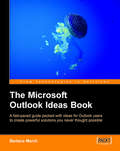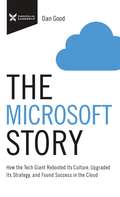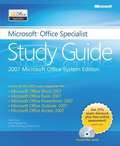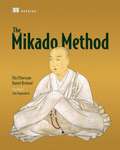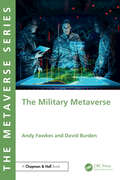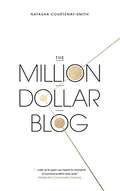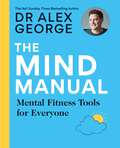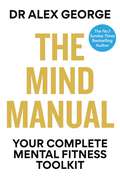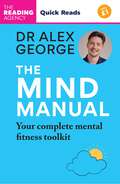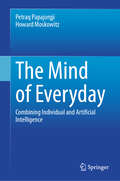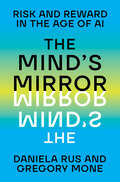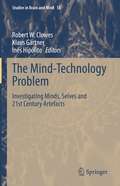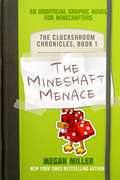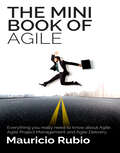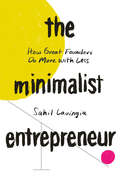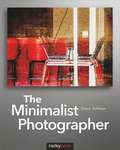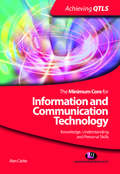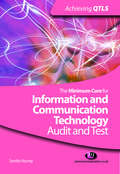- Table View
- List View
The Microsoft Outlook Ideas Book
by Barbara MarchThis book takes a practical, hands-on approach to working with Microsoft Outlook. Carefully structured to lead you through all the steps of each examples, this book will help you to use Outlook in ways you never imagined possible. This book is for users who are comfortable with the basic functions of Outlook, but who want inspiration and direction on manipulating its features to produce powerful methods of viewing, presenting and reporting the wealth of information that it can hold. Users of Microsoft Access and Excel will recognize the functions and constructs used in some of the examples. The techniques in this book are applicable to all versions of Outlook from 2000 upwards. Where there are functional differences between the versions, these have been noted. You need to be running Outlook with MS Exchange Server to use this book
The Microsoft Story: How the Tech Giant Rebooted Its Culture, Upgraded Its Strategy, and Found Success in the Cloud (The Business Storybook Series)
by Dan GoodImagine if you could see the playbook that returned a struggling tech empire to the top of the tech leaderboard. The Microsoft Story will help you understand and adopt the competitive strategies, workplace culture, and daily business practices that enabled the tech company to once again become a leading tech innovator.<P><P>It wasn’t so long ago that Microsoft and its Windows operating system dominated the tech industry so much so that they faced antitrust charges for what was perceived by many to be predatory, monopolistic practices. Less than a decade later, the tide had turned and Microsoft lost its dominance in the personal tech marketplace amidst the launch of the iPhone, the rise of Google, and the cloud computing phenomenon. But, now, Microsoft is back on top. The company’s value is soaring and once again Microsoft is being recognized as a tech leader once again. What changed? <P><P>Since Satya Nadella took over as CEO, the company has gone through significant changes. The company culture has become one of creativity and innovation, no longer requiring that all products revolve around Windows. The company has reevaluated their business lines, getting rid of underperforming initiatives such as smartphones, and focused on the area of growth where the company excelled: the cloud. <P><P>Through the story of Microsoft, you’ll learn: How to build a nimble company culture that supports innovation and growth. How to return a forgotten brand to the spotlight. How to recognize and build upon successful business lines, while letting go of underperforming initiatives. When to change the entire way you do business. And much, much more.
The Microsoft® Crabby Office Lady Tells It Like It Is: Secrets to Surviving Office Life
by Annik StahlWe all have to work for a living--so why not make that time work for you? Whether you're in a cubicle or corner office, the Crabby Office Lady shows you how to be more productive on the job so that you can really enjoy your time off the job. Humorous but practical, the lovable know-it-all reveals her secrets in this easy-to-read survival guide based on her popular column. You'll get her no-nonsense lessons to succeeding at work, as well as tips and tricks for working with Microsoft Office programs to help simplify your life. She'll give you the straight scoop--so pay attention! Crabby says, "Listen up!"--and discover how to: Manage your daily barrage of email, run effective meetings, and delegate (you might actually get some work done) Mind your workplace manners (and learn to deal with those who don't) Use Crabby's secrets for preparing for performance reviews and building your case for raises Customize Office program settings, use accessibility features, and practice healthy ergonomics to make your office your own Decode convoluted computer terms Take the stress out of fleeing--and enjoy your time off--with Crabby's get-away-from-it-all checklist
The Microsoft® Office Specialist Study Guide
by Joan Preppernau Joyce CoxDemonstrate your expertise with the 2007 Microsoft Office system! This comprehensive study guide covers all the Microsoft® Office Specialist Study Guide exams for Microsoft Office, including Word 2007, Excel® 2007, Outlook® 2007, PowerPoint® 2007, and Access® 2007. For each exam, you'll build the skills and knowledge measured by its objectives through a series of step-by-step exercises, practice questions, and real-world scenarios. Easy-to-follow screen shots and explanations bring key concepts to life and expertly guide you through the material. The CD includes the practice files for all the book's lessons. Earn the premier credential and showcase your expertise in the popular Microsoft Office programs! A Note Regarding the CD or DVD The print version of this book ships with a CD or DVD. For those customers purchasing one of the digital formats in which this book is available, we are pleased to offer the CD/DVD content as a free download via O'Reilly Media's Digital Distribution services. To download this content, please visit O'Reilly's web site, search for the title of this book to find its catalog page, and click on the link below the cover image (Examples, Companion Content, or Practice Files). Note that while we provide as much of the media content as we are able via free download, we are sometimes limited by licensing restrictions. Please direct any questions or concerns to booktech@oreilly.com.
The Mikado Method
by Daniel Brolund Ola EllnestamSummaryThe Mikado Method is a book written by the creators of this process. It describes a pragmatic, straightforward, and empirical method to plan and perform non-trivial technical improvements on an existing software system. The method has simple rules, but the applicability is vast. As you read, you'll practice a step-by-step system for identifying the scope and nature of your technical debt, mapping the key dependencies, and determining the safest way to approach the "Mikado"—your goal.About the TechnologyThe game "pick-up sticks" is a good metaphor for the Mikado Method. You eliminate "technical debt" —the legacy problems embedded in nearly every software system— by following a set of easy-to-implement rules. You carefully extract each intertwined dependency until you expose the central issue, without collapsing the project.About the BookThe Mikado Method presents a pragmatic process to plan and perform nontrivial technical improvements on an existing software system. The book helps you practice a step-by-step system for identifying the scope and nature of your technical debt, mapping the key dependencies, and determining a safe way to approach the "Mikado"—your goal. A natural by-product of this process is the Mikado Graph, a roadmap that reflects deep understanding of how your system works. This book builds on agile processes such as refactoring, TDD, and rapid feedback. It requires no special hardware or software and can be practiced by both small and large teams.Purchase of the print book includes a free eBook in PDF, Kindle, and ePub formats from Manning Publications.What's InsideUnderstand your technical debtSurface the dependencies in legacy systemsIsolate and resolve core concerns while creating minimal disruptionCreate a roadmap for your changesAbout the AuthorsOla Ellnestam and Daniel Brolund are developers, coaches, and team leaders. They developed the Mikado Method in response to years of experience resolving technical debt in complex legacy systems.Table of ContentsPART 1 THE BASICS OF THE MIKADO METHODMeet the Mikado MethodHello, Mikado Method! Goals, graphs, and guidelinesOrganizing your workPART 2 PRINCIPLES AND PATTERNS FOR IMPROVING SOFTWARE Breaking up a monolith Emergent designCommon restructuring patterns
The Military Metaverse
by David Burden Andy FawkesThe Military Metaverse explores the impact that the Metaverse is having today on how the world's militaries procure, maintain, train, plan and fight, and how the Metaverse presents new challenges and opportunities for future conflict.The military were early adopters of Virtual Reality and Augmented Reality technologies and wider simulation systems. Before 2010 they were one of the few sectors that could afford the technology, and millions of military R&D dollars went into developing and understanding these technologies. However, as the democratisation of metaverse technologies has happened over the past decade there is a danger that militaries have been overtaken and caught short, encumbered with expensive legacy systems, sold and maintained by expensive prime contractors, whilst the gaming and consumer market has cheaper and more innovative and agile systems. The book provides a history of the use of metaverse technologies in the military, particularly in the areas of design, maintenance, training, planning and operations. It then examines the current state of the art in these areas and the opportunities that are available from the current generation of consumer-driven approaches. The drivers for, challenges to, and paths towards an enterprise approach to the Military Metaverse are then presented. The book explores the military use of social virtual worlds, of early work done by defence and security organisations in worlds such as Second Life, and how such environments could become important for intelligence as well as influence operations in the future. Finally, the book will consider what war in the Metaverse might look like, both in terms on in-world activities and the impact of cyber-war on the Metaverse itself.It should be of interest to all militaries across the world, the industries that support them, and those in academia and the wider public with an interest in the military and defence.
The Millennial's Guide to Changing the World: A New Generation's Handbook to Being Yourself and Living with Purpose
by Alison Lea SherA guide and blueprint to a purposeful millennial existence—and how we can make a difference. What does it mean to be a millennial in this chaotic world? Beyond Snapchat and Tinder, the consumerist culture we’ve inherited, and quarter-life crises, can a millennial aspire to more? Alison Lea Sher argues, yes, we can! Packing herself up in an RV, Sher embarks on a road trip in hopes of starting a conversation about what it means to grow up in America, post-Great Recession. Interviewing 150 of her millennial peers as they begin their adult lives—from kids heading straight to Wall Street after college to those sleeping on it—Sher asks: “Who are you; what should you do; and how can you step into your destiny as a stakeholder in society?” The Millennial’s Guide to Changing the World is a one-of-a-kind ethnographic study on the spotlighted millennial generation, as told by millennials—the largest generation in US history that is now transitioning from adolescence to adulthood. As millennials embark on a young adult quest during a frightening time, how can they enlist the idealism, values, and resistance politics they are so well-known for to discover a sense of self and purpose? Learn how to: “Adult”—and not in the way society defines itRide the technology revolution, instead of letting it ride youBe ethical, inclusive, and sex-positive in your relationshipsResist the corporate oligarchy we live inRecognize privilege, embrace diversity, and fight for equalitySave the earth, literally With intimate stories, ethnographic research, and practical tips, The Millennial’s Guide to Changing the World will inspire every young person, showing them how to optimize their coming-of-age potential in a world that desperately needs it.
The Million Dollar Blog
by Natasha Courtenay-SmithIn a world where everyone wants to blog and blog posts are ubiquitous, how do you stand out? How do you blog your way from nobody to somebody?How do you make money blogging, how do you start your own blogging business, and how do you, as a business owner, use content to build your brand and drive your success? What do the world's most successful bloggers know that you don't know (yet)? No matter who are you - a mum at home, a budding fashion blogger, a lifestyle blogger, a food blogger, a big business owner or a small business owner - The Million Dollar Blog is about blogging the smart way. It is the ultimate guide to:*Starting a successful blog*Blog writing*How to monetise your blog*How to develop a personal brand that grows your blog*How to blog for business*How to write*How take your existing blog to the next levelLearn to blog, learn to monetise your blog, discover how to build a successful blog for your business and hear the insider view from those in the blogosphere who are already making big incomes blogging. Plus, discover revenue streams beyond advertising and see how the income of million dollar bloggers is structured for maximum profit. Through a combination of practical advice and interviews with some of the world's most famous and successful bloggers, vloggers and content strategists, including Seth Godin, Lily Pebbles, Grant Cardone and Madeleine Shaw and dozens more, entrepreneur and digital strategist Natasha Courtenay Smith shows you how to build a blog that will increase your profile, create new opportunities, earn money and change your life. No wonder The Million Dollar Blog has been described by leading and award winning mummy blogger Vicky Psarias from Honest Mum as 'Brilliantly written, engaging and inspiring'.
The Mind Manual: Mental Fitness Tools for Everyone (Dr Alex George)
by Dr Alex GeorgeMental health matters! Learn how to assess your mental health today - and understand what's normal for you. Discover the seven universal truths that everyone should remember, and the mental fitness foundations that will boost you. And exercise your mind with the mental health toolkit that will help you thrive. Contents include -Part One: Your Mental Health Today-You are not alone-Know what feels normal for youPart Two: The Seven Universal Truths-Boundaries are beautiful-Mistakes are a must-havePart Three: Mental Fitness Foundations-It's good to talk-Why medical help mattersPart Four: Mental Health ToolkitResources
The Mind Manual: Mental Fitness Tools for Everyone (Dr Alex George)
by Dr Alex GeorgeMental health matters! Learn how to assess your mental health today - and understand what's normal for you. Discover the seven universal truths that everyone should remember, and the mental fitness foundations that will boost you. And exercise your mind with the mental health toolkit that will help you thrive. Contents include -Part One: Your Mental Health Today-You are not alone-Know what feels normal for youPart Two: The Seven Universal Truths-Boundaries are beautiful-Mistakes are a must-havePart Three: Mental Fitness Foundations-It's good to talk-Why medical help mattersPart Four: Mental Health ToolkitResources
The Mind Manual: Mental Fitness Tools for Everyone (Dr Alex George)
by Dr Alex GeorgeYour complete mental fitness toolkit by Dr Alex George'How are you? No really, how are you?'Learn how to assess your mental health today and understand what's normal for you.This is the mental health toolkit that will help you thrive.The Mind Manual is broken down into four parts with each one building on the last. Thegoal is to help you to establish your baseline, to know what peace feels like to you. Andthen to offer advice and tools to help you maintain that as much as possible.Part 1 looks at how to figure out where your baseline is and what normal feels like foryou. It's all about recognising your own needs so that you can best support yourselfwhen issues arise.Part 2 explores the seven universal truths and how they can support you when youmind is telling you lies. These seven truths are: Connection is your superpower; Sleepwill save you; Boundaries are beautiful; Mistakes are a must-have; Stress is the enemy;You are enough; Happiness is an inside job.Part 3 focuses on the foundations of mental fitness and explores the five different areasof life. These include what you eat and drink, how you release stress from your body,how much you move, how to talk out your thoughts and how to approach the medicalside of things.Part 4 is your mental health toolkit, where you'll find a wide range of worksheets andactivity tools to use. These can help while reading the book, but can also be usedregularly in your day-to-day life to check in on how you're coping.
The Mind Manual: Mental Fitness Tools for Everyone (Dr Alex George)
by Dr Alex GeorgeYour complete mental fitness toolkit by Dr Alex George'How are you? No really, how are you?'Learn how to assess your mental health today and understand what's normal for you.This is the mental health toolkit that will help you thrive.The Mind Manual is broken down into four parts with each one building on the last. Thegoal is to help you to establish your baseline, to know what peace feels like to you. Andthen to offer advice and tools to help you maintain that as much as possible.Part 1 looks at how to figure out where your baseline is and what normal feels like foryou. It's all about recognising your own needs so that you can best support yourselfwhen issues arise.Part 2 explores the seven universal truths and how they can support you when youmind is telling you lies. These seven truths are: Connection is your superpower; Sleepwill save you; Boundaries are beautiful; Mistakes are a must-have; Stress is the enemy;You are enough; Happiness is an inside job.Part 3 focuses on the foundations of mental fitness and explores the five different areasof life. These include what you eat and drink, how you release stress from your body,how much you move, how to talk out your thoughts and how to approach the medicalside of things.Part 4 is your mental health toolkit, where you'll find a wide range of worksheets andactivity tools to use. These can help while reading the book, but can also be usedregularly in your day-to-day life to check in on how you're coping.
The Mind Manual: Mental Fitness Tools for Everyone (Dr Alex George)
by Dr Alex GeorgeTHE SUNDAY TIMES BESTSELLER (December 2023)Mental health matters! Learn how to assess your mental health today - and understand what's normal for you. Discover the seven universal truths that everyone should remember, and the mental fitness foundations that will boost you. And exercise your mind with the mental health toolkit that will help you thrive.
The Mind Manual: Mental Fitness Tools for Everyone (Dr Alex George)
by Dr Alex GeorgeTHE SUNDAY TIMES BESTSELLER (December 2023)Mental health matters! Learn how to assess your mental health today - and understand what's normal for you. Discover the seven universal truths that everyone should remember, and the mental fitness foundations that will boost you. And exercise your mind with the mental health toolkit that will help you thrive.
The Mind of Everyday: Combining Individual and Artificial Intelligence
by Petraq Papajorgji Howard MoskowitzThe advent of artificial intelligence (AI) is associated with relevant changes in how we live today. AI has the potential to significantly enhance daily decision-making by providing tailored, data-dependent insights and aiding in intricate analysis. AI-based systems will be around us, helping and advising us in our everyday tasks. However, how well do these systems perform in their quest to "replace" the human brain? A "meter," a procedure for comparing the outcomes obtained by artificial intelligence systems with those obtained by human systems, is necessary to address this issue. This "meter" is Mind Genomics, a new emerging science that delves into the science of how we, as humans, organize and respond to information. To evaluate whether there are differences in the results obtained by AI-based systems and human-based experiments based on 'Outer Psychophysics' were designed and implemented. Thus, four experiments in crucial areas of our lives are selected and cover education, family stress, and environmental and governmental policies. For each area, a Mind Genomic experiment is designed, defining four topics (silos). Then, the elements contained in each of the silos were generated twice, once by humans and then by an AI-based system. Evaluating both systems' performance requires comparing the results obtained by both experiments. The analysis of the study cases is disciplined, rich in scientific tools, and presented with methods. Through a blend of theoretical exploration, case studies, and practical applications, this book aims to inspire readers with the potential of the fusion of Mind Genomics and AI to empower innovation, enhance user experiences, and bring forth a more nuanced understanding of human thought. Whether the reader is a student, a researcher in the field of social and political sciences, or simply curious about the evolving landscape of science and technology, we hope this book will serve as an invitation to explore how we can harmonize human and machine intelligence to better navigate the complex world around us.
The Mind's Mirror: Risk and Reward in the Age of AI
by Gregory Mone Daniela RusAn exciting introduction to the true potential of AI from the director of MIT’s Computer Science and Artificial Intelligence Laboratory. Imagine a technology capable of discovering new drugs in days instead of years, helping scientists map distant galaxies and decode the language of whales, and aiding the rest of us in mundane daily tasks, from drafting email responses to preparing dinner. Now consider that this same technology poses risks to our jobs and society as a whole. Artificial Intelligence is no longer science fiction; it is upending our world today. As advances in AI spark fear and confusion, The Mind’s Mirror reminds us that in spite of the very real and pressing challenges, AI is a force with enormous potential to improve human life. Computer scientist and AI researcher Daniela Rus, along with science writer Gregory Mone, offers an expert perspective as a leader in the field who has witnessed many technological hype cycles. Rus and Mone illustrate the ways in which AI can help us become more productive, knowledgeable, creative, insightful, and even empathetic, along with the many risks associated with misuse. The Mind’s Mirror shows readers how AI works and explores what we, as individuals and as a society, must do to mitigate dangerous outcomes and ensure a positive impact for as many people as possible. The result is an accessible and lively exploration of the underlying technology and its limitations and possibilities—a book that illuminates our possible futures in the hopes of forging the best path forward.
The Mind-Technology Problem: Investigating Minds, Selves and 21st Century Artefacts (Studies in Brain and Mind #18)
by Inês Hipólito Robert W. Clowes Klaus GärtnerThis edited book deepens the engagement between 21st century philosophy of mind and the emerging technologies which are transforming our environment. Many new technologies appear to have important implications for the human mind, the nature of our cognition, our sense of identity and even perhaps what we think human beings are. They prompt questions such as: Would an uploaded mind be 'me'? Does our reliance on smart phones, or wearable gadgets enhance or diminish the human mind? and: How does our deep reliance upon ambient artificial intelligence change the shape of the human mind? Readers will discover the best philosophical analysis of what current and near future 21st technology means for the metaphysics of mind. Important questions are addressed on matters relating to the extended mind and the distributed self. Expert authors explore the role that the ubiquitous smart phone might have in creating new forms of self-knowledge. They consider machine consciousness, brain enhancement and smart ambient technology, and what they can tell us about phenomenal consciousness. While ideas of artificial general intelligence, cognitive enhancements and the smart environment are widely commented on, serious analysis of their philosophical implications is only getting started. These contributions from top scholars are therefore very timely, and are of particular relevance to students and scholars of the philosophy of mind, philosophy of technology, computer science and psychology.
The Minecraft Ideas Book: Create the Real World in Minecraft
by Thomas McBrienDiscover more than 70 mind-blowing build ideas – plus tips, tricks, and hacks from expert Minecraft builders in this official Minecraft book.Spark your imagination with incredible build ideas inspired by the world around you. Explore landmarks, natural wonders, and inventions. From the Great Wall of China and the Great Barrier Reef, to steam trains and the International Space Station, get suggestions for how to build them all in Minecraft – and discover fascinating facts about them, too. The Minecraft Ideas Book is packed with all kinds of imaginative build ideas, including a cross-section of a volcano, a fabulously fun fairground, a Mount Everest base camp, a rainforest with canopy bridge, and much, much more. Why not step back in time to build the Titanic or a Roman chariot race or fast-forward to the future and build a sustainable city? Anything is possible! What will you build first? Find building techniques, hints, and tips throughout, such as block hacks, planning tips, and ideas for customizing. Meet the expert builders and discover where they get their ideas from. See the Minecraft world – and the real world – as you&’ve never seen it before!© 2023 Mojang AB.
The Minecrafter's Cookbook: More Than 40 Game-Themed Dinners, Desserts, Snacks, and Drinks to Craft Together
by Tara TheoharisThe Minecrafter's Cookbook brings the Overworld to life with over 40 fantastic, Minecraft-themed recipes that kids and parents can make together. From main courses that will fill your hunger bar; to enchanted snacks that Alex and Steve couldn’t survive without; to party-friendly, game-themed desserts and potion drinks, there is plenty in this book to enchant young gamers and their families. Kids will love the accompanying illustrations of their favorite characters and scenes, while parents will appreciate the simple, step-by-step directions to guide them as they craft. The Minecrafter's Cookbook makes cooking an irresistible adventure: Includes photos of each finished item, plus colorful illustrations of popular Minecrafting scenes and characters for maximum fun. Features over 40 kid-friendly meals, drinks, and desserts including Beetroot Stew, Golden Apples, Grass Block Brownies, and Creeper Crispies! Encourages young gamers to power down and enjoy family time in the kitchen The delicious recipes in this book are sure to make spending time together a whole lot more fun!
The Mineshaft Menace: An Unofficial Graphic Novel for Minecrafters (The Cluckshroom Chronicles #1)
by Megan MillerA new illustrated graphic novel series for Minecrafters from New York Times bestselling author Megan Miller featuring Minecraft's new AR platform Minecraft Earth! When Kiri, Oscar, and Malik meet up after school to play an adventure in Minecraft Earth, they stumble upon a secret door that takes them out of the real world above and whisks them into a hidden underground mineshaft. Transformed into their Minecraft avatars, they must now face Minecraft monsters that are all too real. And as they try to help a band of lost villagers beset by giant poisonous spiders, they&’re confronted by the biggest Minecraft menace they&’ve ever seen. Fans of Minecraft will love this action-packed story with elements and themes pulled right from their favorite video game.
The Mini Book of Agile: Everything you really need to know about Agile, Agile Project Management and Agile Delivery
by Abdelhamid Zebdi Mauricio RubioLearn all about Agile, Agile project management, and Agile Delivery to put Agile into practice at work and in your personal projectsKey FeaturesExplore the key concepts of Agile development, Agile project delivery, and Agile project managementStudy the different Agile concepts such as user stories, story points, epics, and product backlogUnderstand why Agile is different from traditional project delivery and other methodologiesBook DescriptionThink of this book as Agile for Dummies (or Agile for anyone and everyone). This Agile book will allow you to master the most important concepts of Agile development, Agile project delivery, and Agile project management. This mini book has been designed to enable you to manage your projects in an Agile way.This mini book will walk you through the fundamentals, principles, and key concepts of Agile, Agile project management, and Agile Delivery.The book includes valuable resources, graphics, and examples that will allow you to grasp the key essence of Agile, Agile rituals, Agile practices, Agile concepts, and the key differences between Agile and traditional project management.After reading this book, you will have a thorough understanding of Agile and how to put Agile into practice at work and in your personal projects.What you will learnReview the background and function of Agile and its advantagesEncounter the differences between Agile and WaterfallExplore Agile principles, culture, and rolesExplore fundamental concepts, Agile artifacts, ritualsBecome familiar with some important Agile toolsWho this book is forThis book is for anyone who wants to learn the fundamentals, principles, and key concepts of Agile, Agile project management, and Agile Delivery. No prior Agile experience or knowledge is necessary.
The Minimalist Entrepreneur: How Great Founders Do More with Less
by Sahil Lavingia&“Pay attention.&”—Jason Fried A revolutionary roadmap for building startups that go the distance Now more than ever, you don&’t need a fancy office, Ivy League degree, or millions of dollars in venture capital to launch a business that matters for the communities you care most about. Software, the internet, and remote work have made it possible for entrepreneurs to start for free, make a customer of anyone, and grow a profitable, sustainable company from anywhere. Packed with hard-won, battle-tested lessons from Lavingia&’s own journey of building Gumroad, a platform for creators to sell their work, The Minimalist Entrepreneur teaches founders how to: • start then learn • build a community, then solve a problem for them • charge for something even before you&’ve built anything • avoid running out of money and, more importantly, energy • run a tight ship amid the rise of the gig economy and remote work • own a business without it owning you back. The Minimalist Entrepreneur is the manifesto for a new generation of founders who would rather build great companies than big ones. This is essential knowledge for every founder aspiring to build a business worth building.
The Minimalist Photographer
by Steve JohnsonThis book covers photography from a minimalist perspective, proving that it is possible to take very good photographs with relatively cheap equipment. The minimalist process emphasizes the importance of first knowing what you want to achieve as a photographer and then choosing the most effective equipment, subject matter, and general approach to meet your goals. The minimalist photographer works with the idea that the brain and the eye are far more important than the camera. Author Steve Johnson begins by asking you, the reader, to look inward and make the connections between your nature and your photography. Why do you want to take photographs and what subject matter are you attracted to? What type of photographer are you now and what type of photographer would you like to become? These are important questions to consider when deciding what approach works best for you. In subsequent chapters, you'll learn about the equipment and workflow of a minimalist photographer as Johnson discusses the strengths and weaknesses of various types of cameras and explains why the biggest or most expensive piece of equipment is not always the best. He also addresses the importance of lighting and teaches you how to achieve effective lighting without spending a lot of money. Also included are discussions about aesthetics and composition, as well as a brief history of photography and the future of the art form.
The Minimum Core for Information and Communication Technology: Audit And Test (Achieving QTLS Series)
by Alan ClarkeThe teacher training framework, introduced in September 2007, requires all teachers in the post-16 sector to possess knowledge, understanding and personal skills to at least level 2 in the minimum core for ICT. Coverage and assessment of the minimum core have to be embedded in all Certificate and Diploma courses leading to QTLS and ATLS status. This book is a practical guide to ICT for trainee teachers in the Lifelong Learning Sector. It enables trainee teachers to identify and develop their own ICT skills and to support their students in ICT.
The Minimum Core for Information and Communication Technology: Audit And Test (Achieving QTLS Series)
by Sandra MurrayThis book supports trainee teachers in the Lifelong Learning Sector in the assessment of their knowledge of ICT. A self-audit section is included to help trainees understand their level of competence and confidence and will help them identify any gaps in their knowledge and skills. This is followed by exercises and activities to support and enhance learning. The book covers all the content of the LLUK standards for the minimum core for information and communication technology. Coverage and assessment of the core have to be embedded in all Certificate and Diploma courses leading to QTLS and ATLS status.
